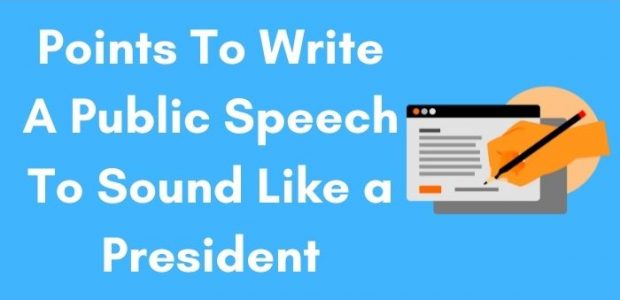
Can you think of one thing that all notable presidents throughout history had in common? They were all great public speakers. They had the ability to convince the audience of their personal point of view, and they did it in a powerful way. So read the points to write a public speech sound like a president and deliver a great speech.
Let’s take an example: President Franklin Roosevelt’s first inaugural address. It was bold, passionate, and believable. Roosevelt made surprising promises and delivered reassurance at the same time. Years after the event, it’s still one of the most powerful public speeches a president has ever made.
Students are expected to practice their public speaking skills throughout college, so they can achieve such a level in the future. But without any experience, how do you write and deliver a speech like that?
Tips for Students: How to Write a Successful Public Speech
Here we have mentioned some points to writing a public speech to sound like a President:
Start with a Plan
A speech should always start with a strategy. Your first step is to decide on the theme and key message. Then you’ll start writing around that point. When you listen to a talented speechwriter talk in front of an audience, it’s not just about their charismatic personality. It’s mostly about the point they make. A strong message is the most challenging aspect of speech writing for students, and it’s the most common reason why they seek help. But a proper plan can save the entire process further on.
These are the main questions to answer to plan the speech:
- What message do you want to deliver?
- What effect do you want to achieve?
- Who is your target audience and why should they care about what you say?
- What values do you stand for?
- What problem are you addressing and what solutions can you offer?
When you answer these questions, you’ll have the skeleton of your outline. You’ll just need to fill in the gaps with powerful writing. Your ideas must effectively reach the target audience, or else you will miss the whole point. You also need observation skills because it helps you read the environment, principles, and nature of your audience.
Managing time
Managing your time during a speech is just as crucial as planning your content. Extending your speech for too long will tire out your audience. Keeping your public speech crisp and to the point must be your goal. The feedback you get from your colleagues will also help you in time management.
You must give sufficient time to each topic and divide it based on its importance. If you wish to make your presentation accessible to your audience in the long term, consider recording it. You can then remove any bits you want and upload the video for people to check later. Offering it on-demand will also allow you to reach a wider audience and lead to increased attendance the next time you give a public speech. Consider the idea of starting a webinar project. Hosting multiple webinars grows your recognition in your field, and you will see your audience rising over time.
Also Read: SEO Content Writing For Small Business
Evaluate Your Audience’s Attention Span
This is a major aspect of good planning: even a masterful speech will be a failure when delivered in front of the wrong audience. You should always know who you’re talking to and how focused those people are.
When you know the interests of your target listener, you should address them at the beginning of your speech. That’s when most people are most focused. Then, keep spicing up the draft with humor, drama, or interesting facts to lift up their spirit throughout the middle and end sections.
It’s a mistake to cover too many ideas in a single speech. That’s a sure way of ending up with bored listeners, who would remember little of what you said.
Throw In Some Research
Take a look at the most popular TED talks of all time, and you’ll notice something unusual: most of them include research facts. That’s a good way to prove your point and show that you know what you’re talking about. Plus, when laid out in an interesting way, facts will grab the listeners’ attention. That’s why most public speakers include them at the beginning of their presentations.
Do your research well! You have to present factual, current information that hasn’t been refuted by other studies.
Know What NOT to Do
When trying to write the perfect speech, it’s helpful to know what you should avoid. First of all, don’t apologize for being nervous! Everyone is nervous when speaking in front of an audience. Even if you’re extremely anxious about it, don’t acknowledge it. Saying it will only make you more nervous. The focus should be on your speech; not your nerves.
Another important thing is NOT to tell your audience how long your speech will be. Saying “This will only take ten minutes” is not a good idea, since the listeners will only be thinking about the time left before their break. Just try to maintain a steady flow of speaking and keep things interesting, so nobody will be bored enough to look at their watch.
Don’t Forget to Practice!
It’s hard for inexperienced students to speak in public. Writing the speech is the main obstacle to overcome, but it’s not the only one. Giving a spontaneous speech may work, but it’s best not to take such a risk. Write the draft, prepare a visual presentation, and practice speaking! You can invite some of your friends to practice the speech in front of them, and ask them for recommendations on improvement. This is the best way to improve your writing skills and you can draft an amazing speech with that.
Final Words: Points To Write A Public Speech Sound Like A President
Trust yourself! When you write a great draft about something important to you, you’ll be really close to delivering a great speech. With these simple tips, you can easily write a speech that sounds like a president. So just follow the above-mentioned points and practice regularly to deliver a speech like a pro.
BIO: Stella Gary has always been impressed by my leadership and communication skills. Through her articles, she helps students to develop those skills and pursue successful careers upon graduation. She has expertise in academic papers and resumes writing. Her free time is for doing yoga, learning different languages, and doing digital art.
